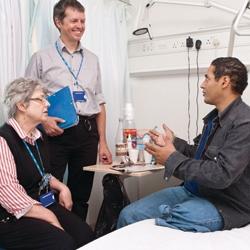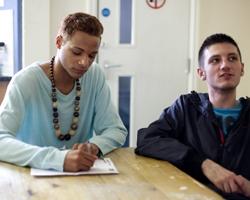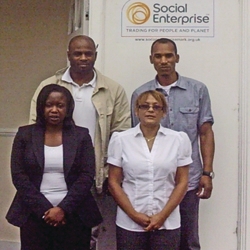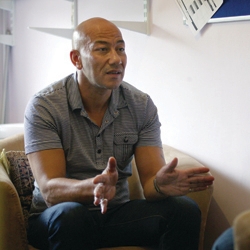Street smarts
Now in their 12th year, the Andy Ludlow Homelessness Awards continue to celebrate the many innovative projects that provide vital help to London’s homeless population. Anita Pati profiles this year’s winner and runners-up
The nation’s capital remains both a draw and a danger to homeless people. More than 3,600 rough sleepers bedded down on London’s streets last year, according to homelessness charity Crisis, and this figure doesn’t begin to touch the thousands of hidden homeless that surf sofas or floors across the city.
Yesterday, the Crypt at London’s famous St Martin-in-the-Fields church played host to the 12th Andy Ludlow Homelessness Awards, run by London Councils and supported by Inside Housing.
The six shortlisted projects demonstrated innovation and flair in helping those without a place to call home, each winning a share of a £51,000 prize fund.
Judge Don Wood, chair of the London Housing Foundation, which funds homelessness organisations, says of the overall winner: ‘Its innovative approach to homelessness captures the true spirit in which the Ludlow awards were set up.’ Without further ado, the prizewinners are…
Winner

London Pathway
University College London Hospital
Prize: £25,000
It was the death of a homeless man on the steps of University College Hospital in 2008, a man who had been repeatedly treated in UCLH’s own accident and emergency ward, that sparked the London Pathway programme. Professor Aidan Halligan - who is now London Pathway’s chair - was asked to investigate the death. ‘What he found,’ says the project’s acting chief executive Alex Bax, ‘was that no one had done anything bad but no one had done anything good. No one had cared about him.’
Because he’d been classified as difficult, the homeless man was simply treated and discharged as quickly as possible.
Professor Halligan decided to launch London Pathway in July 2009, treating homeless patients who arrived at the hospital in crisis before forging a ‘pathway’ for their long-term care. The service is now up and running following a 12-month pilot and evaluation. It has a dedicated specialist homelessness GP and nurse; the latter role is being developed into a new post called a homeless healthcare practitioner. There is also a support nurse who has just started training nurses at other sites in order to replicate the model.
When a homeless patient is admitted to the hospital, usually at A&E, the nurse explores their emotional and social as well as medical history and why they ended up on the streets. They then ensure patients are in touch with the services they need, such as housing, before they are discharged. Next the GP runs medical checks, co-ordinating care across all hospital departments. Patients often have what are known as ‘tri-morbidities’: a combination of mental health, drug/alcohol and physical problems. They are not discharged until they are well.
‘The hospital, after all, is a place of safety,’ says Mr Bax, adding that they will not discharge a homeless patient unless they have somewhere to stay besides the street.
In a typical month, 21 homeless patients are admitted to the hospital and another 18 are seen in A&E and/or given care in the community.
London Pathway is funded by UCLH Charity and the Camden and Westminster Primary Care Trusts. So far it has cost around £400,000 but expects to save local health services £300,000 a year.
Mr Bax hopes that on replication, the project will start to break down barriers between primary and secondary care and work for other deprived groups in Britain. It is set up as a social enterprise to provide it with the resources to roll out the model.
It also plans a ‘care navigator’ programme where former homeless people will be trained to mentor and speak up for homeless patients and to scour the streets, hostels and other care settings for vulnerable homeless people to help.
Runner-up

Youth Engagement Scheme
Cricklewood Homeless Concern
Prize: £10,000
It all started with a deal. In 2008, Cricklewood Homeless Concern persuaded police to leave alone a gang of youths it noted was consistently being arrested by the police and deplored by the local community for their anti-social, street-based activities. All nine members were ex-offenders.
The north London organisation told local officers that if they refrained from approaching the group ‘we’ll try to engage them’, explains CHC chief executive Danny Maher. The deal was simple: ‘You give them the choice of crime or CHC,’ says Mr Maher. The youth engagement scheme was born.
‘What is key is that we as a charity found it much easier to engage with the group than statutory agencies like the police and the council,’ adds
Mr Maher.
None of the nine core members have re-offended in the past two years. Instead they have become leaders among their peers, catching other local young people likely to fall into a cycle of homelessness and anti-social behaviour before it happens. All are aged between 16 and 25, most arriving in London from war-torn African countries.
The project is unique, argues Mr Maher, because young people themselves manage it, forming a steering committee to develop community projects.
To engage other young people at risk, they run activities such as summer football and boxercise sessions.
The scheme has attracted 94 recruits since 2008, mainly black and minority ethnic males. Its young people sit on local resident association and safer neighbourhood panels.
Runner-up

Creating Positive Futures work programme
New Horizon Youth Centre
Prize: £10,000
Launched in October 2009, the Creating Positive Futures work programme provides life skills and career guidance for young homeless people that attend the New Horizon Youth Centre in central London. Most people who visit NHYC suffer from emotional, mental and/or physical health problems and are at risk of offending.
The programme helps them access education, employment and training.Its staff have worked with 521 young homeless people aged 16 to 21 in the past year.
The individual is assigned a lifeskills worker who creates a 12-week action plan where young people can take part in accredited literacy, numeracy and lifeskill programmes to re-engage them with society and prepare them for work.
Centre director Shelagh O’Connor says that, while work placements are common for A-level students, ‘we have managed to secure [corporate] support for people from quite disadvantaged backgrounds.
‘Getting that commitment from the corporate sector was hard work but we put lots of effort into developing that relationship.’
One example is the apprenticeships NHYC secured through a partnership with King’s Cross Construction Skills Centre. Attendees also got involved in the renovation work of their own community centre.
A street outreach team of five also reaches vulnerable people such as young transgender sex workers and invites them to visit the day centre.
Shortlisted projects

Broadening Horizons
Depaul UK
Prize: £2,000
Broadening Horizons, launched in late 2008, aims to give homeless and disadvantaged young people the chance to take up supported work experience placements.
Clients aged between 15 and 25 are placed in the arts, voluntary and legal sectors, and are offered an employee reference and help with their CV.
All but two of the 35 young people who started work placements have progressed to training, education and employment.
Morna Lane, trust officer, says the scheme will create opportunities for young people to succeed in their first job.

Vision Housing
Prize: £2,000
Vision Housing, set up in 2007, was conceived when founder Annys Darkwa was a prisoner in HMP East Sutton Park, following a conviction for drug importation. She was struck by the number of inmates who ended up re-offending on release.
Since then, the organisation has given housing advice and support to more than 235 people, guiding them through benefits, further training and employment.
People are housed in quality private rented homes, often relocated outside their offending areas. Members of staff and volunteers have first-hand experience of issues that clients face.
According to a report published by the Ministry of Justice in March,
40 per cent of offenders in England and Wales re-offend. Since January 2007 just 10 per cent of Vision’s clients have re-offended

Brent Dual Diagnosis
St Mungo’s
Prize: £2,000
Single homeless person’s charity St Mungo’s has run the Brent Dual Diagnosis project since 2006. ‘Dual diagnosis’ refers to people with both mental health and drug problems, conditions treated separately by mainstream services. This programme treats them together using an in-house substance-use worker and psychotherapist, both of whom are integrated with a support team, offering 24-hour assistance.
It works with clients over an 18-month period to move them into suitable long-term accommodation.
Peter Cockersell, director of health and recovery at St Mungo’s, says the service adds ‘an extra dimension’ to housing people with dual diagnosis.













